|
|
|
Sort Order |
|
|
|
Items / Page
|
|
|
|
|
|
|
| Srl | Item |
| 1 |
ID:
023442
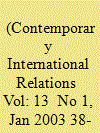

|
|
|
| 2 |
ID:
092465


|
|
|
|
|
| Publication |
2009.
|
| Summary/Abstract |
The use of force in international relations by the West is increasingly witnessing a greater reliance on Special Forces. This trend has profound implications for state action because Special Forces represent a very different kind of soldier and they possess the inherent ability to transgress traditional boundaries in peace and war. The development and participation of UK Special Forces in the Global War on Terror provides a microcosm of the positive and negative dimensions of using secret military units as the force of choice against insurgents and terrorists in Afghanistan, Iraq and indeed on the streets of London.
|
|
|
|
|
|
|
|
|
|
|
|
|
|
|
|
| 3 |
ID:
074552
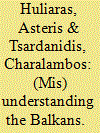

|
|
|
|
|
| Publication |
2006.
|
| Summary/Abstract |
For most Greeks, neighbouring countries like Yugoslavia, Bulgaria, Romania and Albania formed a terra incognita for almost half a century since the end of the Second World War. In the early 1990s communism collapsed in all four countries and despite the three bloody wars that followed the break-up of Yugoslavia, information, goods and people crossed Balkan boundaries in unprecedented speed. The paper examines three geopolitical codes about the Balkans that successively dominated Greek views and policies in the last fifteen years: the idea of a menacing 'muslim arc', the image of the Balkans as a Greek 'natural hinterland' and the idea of the Balkans as an undisputed part of Europe. All these geopolitical ideas were introduced by the Greek political elite and influenced decisively both Greek foreign policy and public attitudes for about half a decade each.
|
|
|
|
|
|
|
|
|
|
|
|
|
|
|
|
| 4 |
ID:
124323
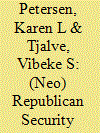

|
|
|
|
|
| Publication |
2013.
|
| Summary/Abstract |
Written from a vantage point in between Security Studies, Political Theory, and Governance Studies, this article attempts to theorize the current mobilization of civil society for the purposes of "national security," "risk precaution," or "homeland resilience" as the emergence of a neo-republican form of security governance-a mode of governance more reliant on organicist means of social construction than on economic or individualist instruments of social control. We argue that if the discipline of International Relations (IR) wishes to understand the nature of this emerging security order, it needs to assume a more cross-disciplinary approach and to develop a much richer idea of republicanism as not only a political philosophy but also a practice of governance.
|
|
|
|
|
|
|
|
|
|
|
|
|
|
|
|
| 5 |
ID:
007800
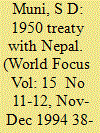

|
|
|
|
|
| Publication |
Nov-Dec 1994.
|
| Description |
38-39
|
|
|
|
|
|
|
|
|
|
|
|
|
|
|
|
| 6 |
ID:
008533
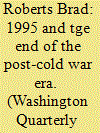

|
|
|
|
|
| Publication |
Winter 1995.
|
| Description |
5-25
|
|
|
|
|
|
|
|
|
|
|
|
|
|
|
|
| 7 |
ID:
131842
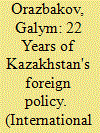

|
|
|
|
|
| Publication |
2014.
|
| Summary/Abstract |
THE LAST QUARTER of the 20th century was marked by growing globalization, which has impacted virtually all spheres of public activity. As it gained momentum, globalization has helped revitalize international collaboration, involving the world's leading economies and global international institutions.
From the early 1990s, vivid discussions unfolded in international political and scholarly circles about a new world order, the role and place of nation states and multinational TNCs in it, and the goals and methods of foreign policy amid the growing globalization. This process confronted many countries with the need to improve their competitiveness on the world market, striking an optimal balance between domestic and foreign policy.
|
|
|
|
|
|
|
|
|
|
|
|
|
|
|
|
| 8 |
ID:
074204
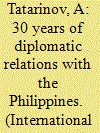

|
|
|
| 9 |
ID:
065366
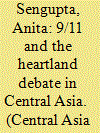

|
|
|
| 10 |
ID:
081491
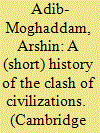

|
|
|
|
|
| Publication |
2008.
|
| Summary/Abstract |
Where does the clash of civilizations thesis and its underlying us-versus-them mentality come from? How has the idea been engineered historically and ideologically in the 'east' and 'west'? What were the functions of Christianity and Islam to these ends? These are some of the questions that will be discussed in this article that engages both the clash of civilizations thesis and the discourse of 'Orientalism' more generally. Dissecting the many manifestations of mutual retributions, the article establishes the nuances of the 'clash' mentality within the constructs we commonly refer to as 'Islam' and the 'west', showing how it is based on a questionable ontology, how it has served particular political interests and how it is not inevitable. What is presented, rather, is a short genealogy of this idea, dispelling some of its underlying myths and inventions along the way
|
|
|
|
|
|
|
|
|
|
|
|
|
|
|
|
| 11 |
ID:
077454


|
|
|
|
|
| Publication |
2007.
|
| Summary/Abstract |
This article evaluates different theories of hierarchy in international relations through a case study of the treaty system that the British constructed in the early nineteenth century in an effort to abolish the slave trade. The treaty system was extraordinarily wide-ranging: it embraced European maritime powers, new republics in the Americas, Muslim rulers in northern and eastern Africa, and "Native Chiefs" on the western coast of Africa. It therefore allows for a comparative analysis of the various types of treaty that the British made, depending on the identity of their contracting partners. The article argues that a broadly constructivist approach provides the best explanation of why these variations emerged. Although British treaty-making was influenced by the relative strength or weakness of the states with which they were dealing, the decisive factor that shaped the treaty system was a new legal doctrine that had emerged in the late eighteenth century, which combined a positivist theory of the importance of treaties as a source of international law with a distinction between the "family of civilized nations" and "barbarous peoples
|
|
|
|
|
|
|
|
|
|
|
|
|
|
|
|
| 12 |
ID:
016158


|
|
|
|
|
| Publication |
July 17-30, 1993.
|
| Description |
32-33
|
|
|
|
|
|
|
|
|
|
|
|
|
|
|
|
| 13 |
ID:
038239
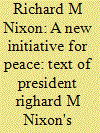

|
|
|
|
|
| Publication |
New Delhi, United States Information Service, 1970.
|
| Description |
10p
|
|
|
|
|
|
|
|
|
|
|
|
Copies: C:1/I:0,R:0,Q:0
Circulation
| Accession# | Call# | Current Location | Status | Policy | Location |
| 006663 | 321.172/UNI 006663 | Main | On Shelf | General | |
|
|
|
|
| 14 |
ID:
053645
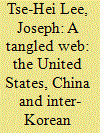

|
|
|
| 15 |
ID:
128428
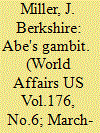

|
|
|
|
|
| Publication |
2014.
|
| Summary/Abstract |
China's aggressive actions in the East China Sea, combined with other factors, especially North Korea's continuing intransigence, have created an increasingly hostile security environment for Japan. Its response to these events can be seen in the impressive political rebirth of Shinzo Abe and the Liberal Democratic Party. While Abe, currently serving as prime minister for a second time, was elected largely because of his economic policies and the ineptitude of the formerly ruling Democratic Party of Japan, he has used his mandate to press forward with long needed, albeit controversial, defense and security reforms that indicate the seriousness with which Tokyo takes its current situation. With China looming up in front of them, and Pyongyang posing lesser but still worrisome threats, the Japanese have become acutely aware of the fact that their Self-Defense Forces (SDF) have one hundred and forty thousand ground troops, one hundred and forty-one maritime vessels, and four hundred and ten aircraft, while China's People's Liberation Army has one million six hundred thousand troops and North Korea has one million soldiers. Meanwhile, North Korea maintains a significant, if decaying, navy and air force, with one hundred and ninety vessels and approximately six hundred aircraft. China's much more capable maritime and air assets include nine hundred and seventy vessels and two thousand five hundred and eighty aircraft.
|
|
|
|
|
|
|
|
|
|
|
|
|
|
|
|
| 16 |
ID:
124389
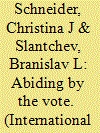

|
|
|
|
|
| Publication |
2013.
|
| Summary/Abstract |
We analyze institutional solutions to international cooperation when actors have heterogeneous preferences over the desirability of the action and split into supporters and opponents, all of whom can spend resources toward their preferred outcome. We study how actors can communicate their preferences through voting when they are not bound either by their own vote or the outcome of the collective vote. We identify two organizational types with endogenous coercive enforcement and find that neither is unambiguously preferable. Like the solutions to the traditional Prisoners' Dilemma these forms require long shadows of the future to sustain. We then show that cooperation can be sustained through a noncoercive organization where actors delegate execution to an agent. Even though this institution is costlier, it does not require any expertise by the agent and is independent of the shadow of the future, and thus is implementable when the others are not
|
|
|
|
|
|
|
|
|
|
|
|
|
|
|
|
| 17 |
ID:
101959
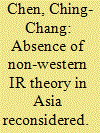

|
|
|
|
|
| Publication |
2011.
|
| Summary/Abstract |
This paper critically examines an ongoing debate in International Relations (IR) as to why there is apparently no non-Western IR theory in Asia and what should be done to 'mitigate' that situation. Its central contention is that simply calling for greater incorporation of ideas from the non-West and contributions by non-Western scholars from local 'vantage points' does not make IR more global or democratic, for that would do little to transform the discipline's Eurocentric epistemological foundations. Re-envisioning IR in Asia is not about discovering or producing as many 'indigenous' national schools of IR as possible, but about reorienting IR itself towards a post-Western era that does not reinforce the hegemony of the West within (and without) the discipline. Otherwise, even if local scholars could succeed in crafting a 'Chinese (or Indian, Japanese, Korean, etc.) School', it would be no more than constructing a 'derivative discourse' of Western modernist social science.
|
|
|
|
|
|
|
|
|
|
|
|
|
|
|
|
| 18 |
ID:
126736
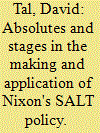

|
|
|
|
|
| Publication |
2013.
|
| Summary/Abstract |
President Richard Nixon and his National Security Adviser, Henry Kissinger took great pride in their success to achieve agreements on the limitation of Anti Ballistic Missiles and the Interim Agreement on Strategic Missiles with the Soviet Union. For Nixon, this agreement was not only an achievement that had been denied to his predecessor, it also seemingly represented the success of his own approach over that of his predecessors. Nixon-in tandem with Kissinger-intended to link arms control negotiations with the Soviet Union to the resolution of other political problems such as Vietnam, the Mideast, and Berlin. Through the employment of linkage, they hoped to make U.S. arms control policy part of Détente. However, Nixon was able to sign the "historic agreements" because his policy of linkage had in fact failed. It failed mainly because it was based on flawed assumptions and false premises. Thus, the historic success was possible precisely because Nixon had not actually made his arms control policy "distinct" from that of the Johnson Administration and its predecessors in his approach to strategic arms talks with the Soviet Union
|
|
|
|
|
|
|
|
|
|
|
|
|
|
|
|
| 19 |
ID:
059259
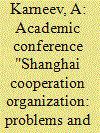

|
|
|
|
|
| Publication |
Oct-Dec 2004.
|
|
|
|
|
|
|
|
|
|
|
|
|
|
|
|
| 20 |
ID:
096572


|
|
|
|
|
| Publication |
2010.
|
| Summary/Abstract |
Foreign aid involves a chain of accountability relationships stretching from international donors through national governments and implementing agencies to a set of ultimate end users of the goods and services financed by the aid. In this paper, I review five different accountability relationships that exist in foreign aid projects among donors, governments, implementing agencies and end users. Then I summarize existing empirical evidence demonstrating that foreign aid functions better-both at the macro-level of aid flows and at the micro-level of individual aid projects-when there is more government and implementing agency accountability. Specifying several mechanisms that facilitate accountability, I emphasize that participation is a tool often used to produce accountability within aid projects. However, in terms of donor accountability to aid-receiving countries and the end users in them, recent pushes for increased participation have not resulted in more accountability in the design of aid programs. Ultimately, although enthusiasm for participatory models of aid design and delivery is warranted, participation is not a panacea for all the accountability problems in foreign aid programs.
|
|
|
|
|
|
|
|
|
|
|
|
|
|
|
|
|
|
|
|
|